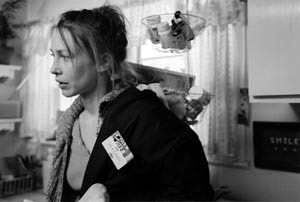
Glitzy to Gritty
Written by Sandy MacDonald | Posted by: Anonymous
Year after year (nine so far), the Nantucket Film Festival has pulled off a balancing act that’s the envy — and inspiration — of many an imitator. The neat trick that sibling founders Jill and Jonathan Burkhardt came up with, in dedicating their gathering to the unsung gifts of screenwriters, is a forum that’s of sufficient interest to pros yet accessible to mere movie-gluttons.
This year, forgoing several high-profile panels (Charlie Kaufman, Jim Carrey, et al), free learn-to-surf sessions, and even the legendary parties, I decided to focus on the films themselves: 30 features and 21 shorts screened in the course of 96 hours. Subsisting on Nutella and Pellegrino (let’s hear it for corporate sponsors!), I emerged pasty and bug-eyed but greatly heartened as to the state of independent filmmaking.
Logistics limited me to about half the fare on view, which conveniently fell into two camps: interpersonal and political. Having absorbed the ‘60s message that the personal is political, I chose what could be perceived as the slacker’s track, favoring narrative features over "docs" (see how quickly we civilians pick up the lingo).
Actually, one of the more interesting films was a hybrid: Debra Granik’s "Down to the Bone," a semi-fictionalized portrait of a drug-afflicted family in hardscrabble Ulster County, New York (it’s not rural New England, but might as well be, a landscape of Price Choppers and sketchy subsistence jobs). Granik, who attended Mass College of Art and Brandeis, originally filmed a half-hour documentary in the area for her NYU film school thesis. "Snake Feed" won Best Short at Sundance in 1998.
At a panel called "From the Blank Page to the Big Screen: Making Your Screenwriting Debut" she recapped the work’s progress from there: Told "You have to front," she holed up with an ungrounded laptop in a leaky shack in Mexico and, with rubber boots on, tapped out 40 pages that qualified her for residency at the prestigious Sundance Writer and Director’s Labs. The resulting script won the Nantucket Film Festival’s Tony Cox Award for Screenwriting in 2002, and it was a very quick, if work-packed stretch from that preproduction phase to the 24-day shoot, accomplished for $200K. The finished product won her the Director’s Award at this year’s Sundance, as well as the NFF’s own Moby Dick Award for Best Screenwriting in a Feature Film.
The film’s cast is unusual in that it seamlessly blends a quartet a professionals — notably, up-and-coming film/TV actor Vera Farmiga, who plays the down-on-her-luck housewife/breadwinner with a habit — with supporting players drawn from the rural community. In a post-screening Q&A, the writer and first-time director explained the advantages (beyond the obvious budgetary benefit): "Self-taught actors" — she eschewed the term "amateurs" — "keep it fresh: they’ll go with the vicissitudes. And if they freeze or seize up, the trained actor will carry the scene." Granik came away from the experience having learned that "you can’t overcontrol" — though she admits to having collected "the ingredients and the details" obsessively before even beginning to shoot: "The process starts with observation — anthropological tropes, longitudinal follow-through on a matrix of character."
"Down to the Bone" is not the most transporting of films. As in real life, there’s no traditional dramatic arc, and little in the way of background music or cinematic legerdemain to create the illusion of one. (Granik waxed mock-rhapsodic over the photogenic qualities of dirty snow.) But the story reads as real, and it deals honestly with an issue of great personal and societal concern. It will be interesting to see where Granik turns her anthropological eye next.
Adults Behaving Badly
The grown-ups in "Down to the Bone" have a hard time keeping their children’s best interests in mind — a theme that emerged as something of a leitmotif in the festival’s other outstanding picks, the most surprising of which was the quiet, unsettling little gem that screenwriter Tod Williams (writer/director of 1998’s quirky adolescent sleeper, "The Adventures of Sebastian Cole") managed to wrest from the short opening segment of John Irving’s characteristically sprawling novel "A Widow for One Year."
How did a relative neophyte pull off such a coup? Williams spent several weeks drafting what must have been a very persuasive proposal: the author ceded the rights for a gentlemanly $1 and an agreement to collaborate on a consensus basis. With marquee names like Kim Basinger and Jeff Bridges starring, and a somewhat sensationalist plot twist involving intergenerational sexuality, it might seem naive to call this movie "small," but it cleaves faithfully to the minute gradations of trust and blind hope that go into any relationship. Bridges is brilliant as a nearly insufferable narcissist of an author/artist, and Basinger affecting as his broken wife. Jon Foster, as the wised-up prep school kid, lives up to the company he keeps, and young Elle Fanning may make you wish there were an Oscar category for four-year-olds.
The couples in "We Don’t Live Here Anymore" — Laura Dern and Mark Ruffalo, Naomi Watts and Peter Krause of "Six Feet Under" — also have trouble keeping their hands to themselves, or at least on their chosen spouses. Drawing on a pair of stories by the late Andre Dubus, whose work tended to center on his home territory, Massachusetts’s Merrimack Valley, Larry Gross — co-writer on the upcoming "Prozac Nation" — deftly delineates two contrasting, academically oriented households: one a slovenly disaster, the latter a bit too neat and contained for its own good. As a vivid, passionate, admitted slob who’s not above fighting dirty, Dern makes the most of a richly written role.
A French entry had its own seemingly sick twist. In veteran writer/director Patrice Leconte’s "Intimate Strangers" (he’s perhaps best know for 1996’s "Ridicule"), an unhappy wife (Sandrine Bonnaire, looking grim and occluded) stumbles into the office of a tax attorney (the wonderfully subtle Fabrice Lucchini, who CV extends as far back as the 1970 Rohmer classic, "Claire’s Knee") and, mistaking him for a psychiatrist, bares her soul; captivated, he fails to disabuse her of the illusion. From the start, the film is so visually oppressive — dark hallways, drab rooms — that it takes a certain fortitude even to stick it out. Gradually, though, as humor glimmers amid an aura of malaise and menace, the viewer’s liberation comes to mirror the characters’.
The fictional fishermen/welfare recipients who inhabit a remote, godforsaken Quebecois island in "Seducing Doctor Lewis" ("La Grande Seduction") might start out stand-up types, but the prospect of snagging a new factory if only they could get a doctor to settle among them proves too strong a temptation: soon they’re lying left and right and going to absurd lengths to create the illusion of an idyllic community. Screenwriter Ken Scott, who joked at a morning coffee that he "stole" the storyline off the Internet ("stealascriptorama-dot-com"), said the scenario appealed to him "because we’re always trying to seduce other people – to make them like us." His goal with the film was simply "to make people laugh for an hour and a half and feel good about having laughed." With the help of some phenomenal comedic actors — famous in Francophone Canada, but unknown here — the movie succeeds magnificently, and stands a good chance of becoming this season’s "Full Monty."
A Dash of Reality
As in years past, the morning coffees — wittily chaired by director Jace Alexander, who has a knack for expanding the inner circle — turned out to be the best way to get the drop on what was worth seeing. The free-wheeling badinage somehow helps sort the visionaries from the mere machers.
That’s how I ended up seeing a hardline political documentary, "Farmingville," produced and directed by Carlos Sandoval and Catherine Tambini, about the racist backlash that whipped through the Long Island suburb of that name in the late ‘90s after 1,500 undocumented Mexican workers filtered into the town of 15,000. There’s little doubt where the filmmakers’ sympathies lie. Sandoval is a fifth-generation U.S. citizen of Mexican and Puerto Rican descent who grew up mowing lawns in Southern California, went to Harvard, got a law degree, and has worked on immigration and refugee affairs as a member of the US delegation to the United Nations. What he and Tambini (co-producer of the Oscar-nominated documentary "Suzanne Farrell: Elusive Muse") managed to do, having spent a year immersed in the community and condensed 200 hours of film into 78 minutes of unrelenting drama, was put a human face on the conflict — actually, many human faces, from the hate-contorted visages of reactionaries who went so far as to hook up with national white-supremacist organizations to the gentle expressions of "Eduardo," who came to what he thought was a country built by people, like him, with a dream.
"Farmingville" debuted on PBS’s "P.O.V." on June 22 and, a day later, became the first independent nonfiction film to be distributed by Netflix, as part of a pioneering new program designed to meet consumer demand.
A Glimpse of the Future
The festival’s opening film — screened two months in advance of its commercial release — was Zach Braff’s "Garden State," an offbeat love story about an antidepressant-benumbed 20-something who returns home for his mother’s funeral and undergoes a series of awakenings. Natalie Portman plays his unconventional beloved with a modicum of whimsy (just shy of too much), and Peter Saarsgard his going-nowhere pothead former buddy with an incisive mix of bitterness and innocence. Brach, who’s employed half the year as the star of the TV show "Scrubs," pulled the whole thing off — writing, producing (on a modest budget), directing, starring – as if such exploits were standard practice for hot commodities on hiatus. It’s a sweet, funny, unpredictable work, loaded with promise.
For more information about the festival, visit http://www.nantucketfilmfestival.org/.










